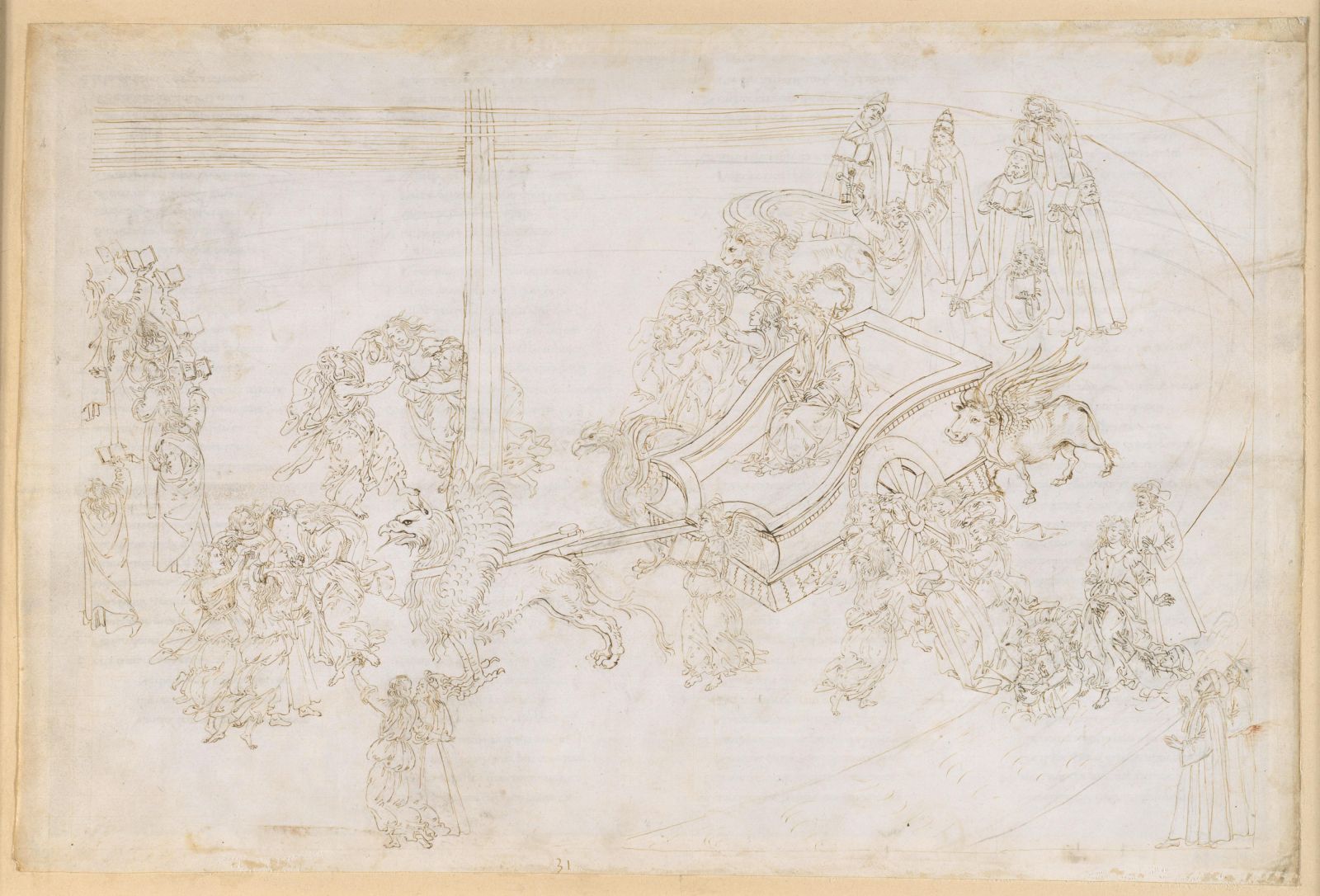Study day
Botticelli’s Dante:
Interpreting the Book in Late Fifteenth-Century Florence
Organized by Rebecca Bowen and Patricia Rubin

Sandro Botticelli, Purgatorio XXXI, silverpoint, graphite, pen and ink on parchment, Staatliche Museen zu Berlin, Kupferstichkabinett / Philipp Allard Public Domain Mark 1.0
In the late fifteenth-century, Sandro Botticelli was involved in the illumination of two ambitious editions of Dante’s Commedia. One was a deluxe book printed in the summer of 1481, a technologically experimental enterprise that visualizes the poem up to Inferno 19. The second is a series of drawings begun for almost every canto on the soft-hair side of parchment sheets, which show the text of the preceding canto on each verso. Uniquely illustrated, this hand-drawn Commedia offers the reader a bold visual experience, with the illustrations occupying as much page-space as the text. The images in the 1481 edition, meanwhile, were allocated to rectangular portions of the text block and occur sporadically from copy to copy. These engravings are much less visually prominent than the ‘Comento di Cristoforo Landino’ which gives the edition its name and shapes the appearance of its pages, dictating the setting of the poem within dense, explanatory blocks.
Produced in the very moment at which the technologies of print and manuscript culture began to coincide in the Tuscan city-state, Botticelli’s Dantean enterprises reveal networks of knowledge exchange and cultural production that are caught up in the entanglements between the images and the text. From the fine-grain of the visual and material details of Botticelli’s envisionings, this Study Day seeks to explore what it meant to visualise Dante’s poem or comment on the journey of his text as book production transitioned between manual and mechanised techniques in late-quattrocento Florence. Opening beyond disciplinary and media-specific boundaries, the workshop seeks to consider questions of materiality and method, as well as modes of reading and accessing the poem, including recitation and exegesis. Participants are invited to explore canti from the grounds of their own specialisms considering topics including the materiality and techniques of book-making and illustration; the experience of the quattrocento reader; the political implications of Dante’s text in late-fifteenth century Florence; representations of bodies, gesture, sense, and space; and the potential uses of Dantean commentaries as a textual tradition that might mirror and, at times, mediate key topics raised in the exchange between the images and the text, ‘legato con amore in un volume’ [bound with love into a single volume, Paradiso 33.86].
Program
4 October 2023
9:00-9:30 Welcome (Gerhard Wolf) & Introduction (Rebecca Bowen and Rafael Uriarte)
9:30–11:00 – Projects on Parchment: Materiality and Technique
Chair: Patricia Rubin (Kunsthistorisches Institut in Florenz)
Nicholas Herman, Parchment preparations: Underdrawings for cycles of manuscript illumination (University of Pennsylvania)
Dagmar Korbacher, Opening up a closed book: Insights, doubts and questions about Botticelli’s Dante (Kupferstichkabinett, Staatliche Museen zu Berlin)
11:00–11:30 – Coffee Break
11:30–13:00 – The Commedia and its Fifteenth-Century Circulation
Chair: Jaś Elsner (Corpus Christi College, University of Oxford)
Guyda Armstrong, Graphic elements of the incunable Dante: visual families of transmission (University of Manchester)
Simon Gilson, Reading Dante in Laurentian Florence: Contexts and Backgrounds to Landino's ‘Comento sopra la “Comedia”’ (1481) (Magdalen College, University of Oxford), online
13:00–14:00 – Lunch Break
14:00–16:15 – Embodying the Narrative
Chair: Bruce Edelstein (New York University, Florence)
Diletta Gamberini, Camminando fra i giganti. Botticelli visualizzatore di Inferno XXXI (Zentralinstitut für Kunstgeschichte, München)
Pietro Bordi, ‘Variarum monstra ferarum’: Bodies, gesture and representations of monster/hybrids in Botticelli’s drawings for Inferno XII (Balliol College, University of Oxford)
Lorenza Melli, Il contesto figurativo dei disegni di Botticelli per la Divina Commedia (Kunsthistorisches Institut in Florenz)
Amanda Hilliam, Drapery and Environment in Botticelli's Dante (Villa I Tatti, The Harvard Center for Italian Renaissance Studies / University of York)
16:15–16:35 – Break
16:35–18:45 –Visualising the Pilgrim’s Journey
Chair: Catherine Keen (University College London)
Hanna Vorholt, Patterns of Movement in Botticelli's Dante (University of York)
Alessandra Forte, La palude stigia e l'ingresso a Dite nella ‘Commedia’ in figura di Botticelli (Inf. VIII-IX): precedenti iconografici e suggestioni esegetiche (Scuola Normale Superiore di Pisa)
Aistė Kiltinavičiūtė, Botticelli's Dreamscapes (University College Cork)
Raymond Carlson, How Botticelli's Experience as a Painter Enabled him to Draw the Flames of Purgatory (Yale University Art Gallery), online
04 October 2023, 9:00am
This will be a hybrid event.
Venue
Palazzo Grifoni Budini Gattai
Via dei Servi 51
50122 Firenze, Italia
To participate online please register in advance via Zoom: https://eu02web.zoom-x.de/meeting/register/u5Uucu2srDotG927bmLf-SGvh7OUpO57ytH6
After registering, you will receive a confirmation email containing information about joining the meeting.
Notice
This event will be documented photographically and/or recorded on video. Please let us know if you do not agree with the Kunsthistorisches Institut in Florenz using images in which you might be recognizable for event documentation and public relation purposes (e.g. social media).


